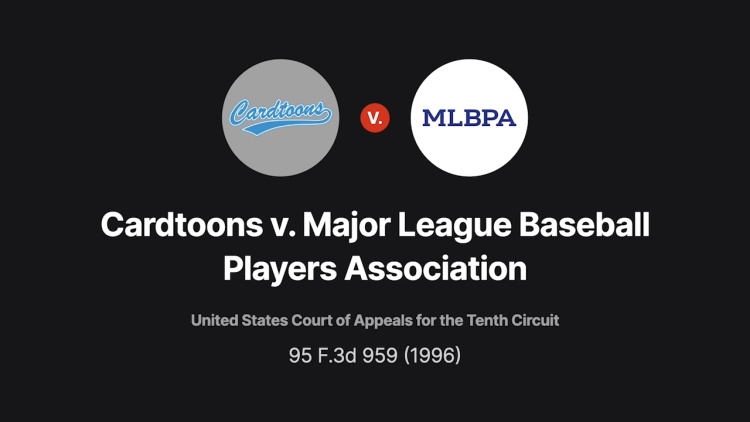Cardtoons v. Major League Baseball Players Association
United States Court of Appeals for the Tenth Circuit
95 F.3d 959 (1996)
- Written by Craig Conway, LLM
Facts
Cardtoons, L.C. (Cardtoons) (plaintiff), an Oklahoma corporation, produced baseball trading cards that parodied major league players. The cards featured animated caricatures of active players on the front and humorous commentary on the back. A person familiar with baseball could readily identify the player lampooned on the trading card. For example, a trading card parodying San Francisco Giants player Barry Bonds was named “Treasury Bonds,” and a card featuring the likeness of Ken Griffey, Jr., was called “Ken Sniffy, Jr.” After the trading cards were advertised for sale, the Major League Baseball Players Association (MLBPA) (defendant), the exclusive agent for all active players, ordered Cardtoons and its printer to halt production of the cards. The MLBPA also operated a group licensing program whereby it entered into licensing arrangements with various companies and vendors, collected any profits, and distributed revenues to individual players. There was no agreement between Cardtoons and the MLBPA. Cardtoons filed suit against the MLBPA and sought a declaratory judgment that it was authorized to produce the parody trading cards without the consent of the MLBPA. The district court held for Cardtoons and the MLBPA appealed.
Rule of Law
Issue
Holding and Reasoning (Tacha, J.)
What to do next…
Here's why 904,000 law students have relied on our case briefs:
- Written by law professors and practitioners, not other law students. 47,100 briefs, keyed to 995 casebooks. Top-notch customer support.
- The right amount of information, includes the facts, issues, rule of law, holding and reasoning, and any concurrences and dissents.
- Access in your classes, works on your mobile and tablet. Massive library of related video lessons and high quality multiple-choice questions.
- Easy to use, uniform format for every case brief. Written in plain English, not in legalese. Our briefs summarize and simplify; they don’t just repeat the court’s language.





